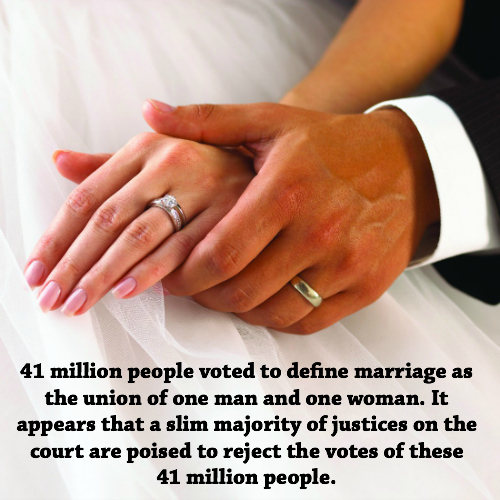Later this month the Supreme Court will hear oral arguments on whether states can define marriage as the union between one man and one woman. Court watchers expect that the court will strike down those laws.
If the justices do this, they will also be striking down the laws in every other state in the country. That is why many have described this case as “the Roe v. Wade of marriage.” It could have the same sweeping impact that the 1973 decision by the court on abortion.
But there is a striking difference. The people of America didn’t go to the polls and vote on abortion. So the court wasn’t nullifying the will of millions of people. True, the court went far beyond what most Americans might have wanted. But there weren’t election results they had to reverse. This time is different. Let’s look at the numbers.
If you just look at the states that passed a constitutional amendment defining traditional marriage, you end up with more the 41 million people who voted to define marriage as the union of one man and one woman. It appears that a slim majority of justices on the court are poised to reject the votes of these 41 million people.
But you might argue that federal judges overturned some of those constitutional amendments. That is true. Approximately two-dozen unelected judges overturned the expressed will of the people in those various elections in about 20 states. They substituted their personal policy preferences to overrule millions of Americans.
You might also mention that in a few states, the citizens did vote for same-sex marriage. Those total votes are about 3 million. Again, that pales in comparison with 41 million who voted for traditional marriage. It is a ratio of more than 12 to 1.
If five members of the Supreme Court rule in favor of same-sex marriage and strike down all the state constitutional amendments, that ratio will be 4,000,000 to 5. Is that really what these arrogant Supreme Court justices want to do? It will send a signal that the vote of the people doesn’t matter and that the high court knows better what is best for the American people.
 Listen Online
Listen Online Watch Online
Watch Online Find a Station in Your Area
Find a Station in Your Area











 Listen Now
Listen Now Watch Online
Watch Online
